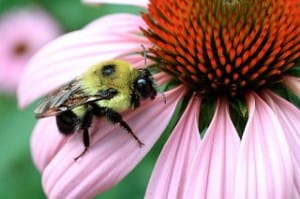

| Visitors Now: | |
| Total Visits: | |
| Total Stories: |

| Story Views | |
| Now: | |
| Last Hour: | |
| Last 24 Hours: | |
| Total: | |
Pesticides Put Bumblebee Colonies at Risk of Failure, Study Finds
Farming pesticides are also killing worker bumblebees, meaning colonies that are vital for plant pollination are more likely to fail
The Guardian
Reuters
Pesticides used in farming are also killing worker bumblebees and damaging their ability to gather food, meaning colonies that are vital for plant pollination are more likely to fail when they are used, a study showed on Sunday.
The United Nations has estimated that one-third of all plant-based foods eaten by people depend on bee pollination and scientists have been baffled by plummeting numbers of bees, mainly in North America and Europe, in recent years.
British scientists said they exposed colonies of 40 bumblebees, which are bigger than the more common honeybee, to the pesticides neonicotinoid and pyrethroid over four weeks at levels similar to those in fields.
Neonicotinoids are nicotine-like chemicals used to protect various crops from locusts, aphids and other pests.
“Chronic exposure … impairs natural foraging behaviour and increases worker mortality, leading to significant reductions in brood development and colony success,” the scientists wrote in the report in the journal Nature on Sunday.
Exposure to a combination of the two pesticides “increases the propensity of colonies to fail”, according to the researchers at Royal Holloway, University of London.
A 2011 UN report estimated that bees and other pollinators such as butterflies, beetles or birds do work worth €153bn ($200bn) a year to the human economy and are in decline in many nations.
The findings underscored the importance of wider testing of pesticides to ensure they do not also target bees, it said.
France banned a neonicotinoid pesticide made by Swiss agrochemicals group Syngenta in June, citing evidence of a threat to the country’s bees. A report last month, however, said that the original research was flawed.
“My guess is that the decline of bees is like a jigsaw -there are probably a lot of pieces to put into place. This is probably a very important piece of that jigsaw,” lead author Richard Gill said.
In a separate commentary in Nature, Juliet Osborne of the University of Exeter in England said the study underscored the need to understand all factors that may contribute to harm bees and to “colony collapse disorder”.
“For example, we have as yet no convincing demonstration of the relative effects of pesticides on bee colonies compared to the effects of parasites, pathogens and foraging resources,” she wrote.
Gill endorsed recommendations by the European Food Safety Authority for longer testing on adult bees and larvae, new ways of assessing cumulative exposure to toxins and separate assessments for different bee species.
He said previous studies had mostly examined the impact of pesticides on individual bees, rather than colonies. Bumblebees form colonies of a few dozen bees, while honeybees can number up to tens of thousands.
“Effects at the individual level can have a major knock-on effect at the colony level. That’s the novelty of the study,” he said.
The average number of bees lost in the experiment – both dead in the nesting box and failing to return – was about two-thirds of the total for bees exposed to a combination of the two pesticides against a third for a control, exposed to neither.
Bumblebees exposed to a combination of pesticides were about half as successful at gathering pollen, used as food, compared to a control. They also devoted more workers to collecting food, meaning fewer were raising larvae.
A study published in the journal Science in March showed for the first time that pesticides seriously harm bees by damaging their ability to navigate home.
Other experts said more research was needed. “It certainly wouldn’t be fair to say that this research spells doom for wild bees,” said James Cresswell of the University of Exeter.
2012-10-23 17:01:08
Source:



